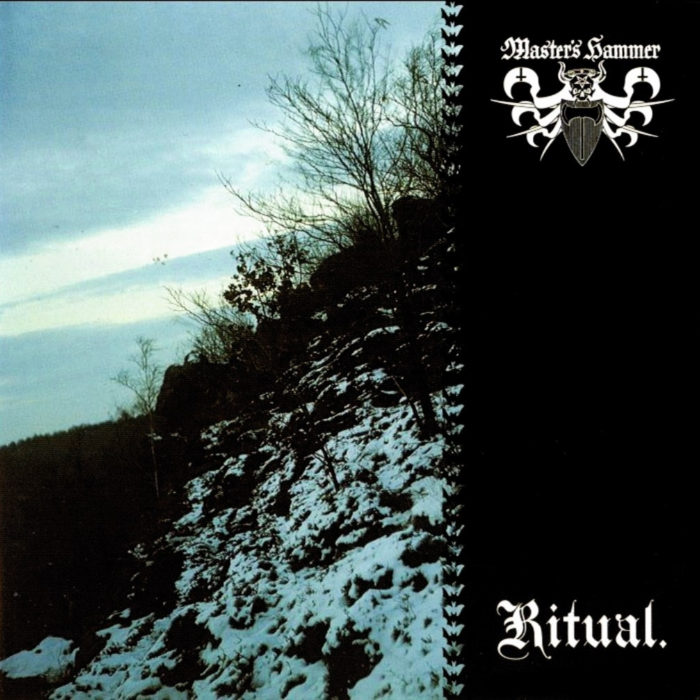Ritual is the pinnacle of the Central European black metal style characterized by continuing the riffing tradition of traditional heavy metal and strict adherence to speed metal song structure; Hellhammer, Mercyful Fate, Slayer, and even Megadeth influences are easily heard along with Bartók’s folkishness and Chopin’s romanticism. While their compatriots Root presaged the Hellenic scene, Master’s Hammer’s operatic use of the mellotron inspired the divergent atmosphere Emperor employed on In the Nightside Eclipse.
The keyboards are tasteful and never overpowering while switching between reenforcing the leads and Franta Storm’s vocals as a mellotron choir. They are not used to connect unrelated riffs in a carnival atmosphere nor to create additional extraneous atmospherics but merely accentuate those already established though the songs’ riffs, melodies, harmonies, and structure. The Czech lyrics leave nonspeakers with illusions of Storm being possessed and speaking in tongues as he echoes the rhythm and lead guitars, raving demonic liturgical incantations and sermons past the point of hoarseness as the devils within compel him to continuing leading the black mass at a witches’ sabbath held deep in a gothic ruin of the thrice-misnomered Holy Roman Empire.
Riff phrasing is immaculate, cyclical, and extended, predecessing later atmospheric takes on the genre but on Ritual is never neutered. Obeying classical rules of composition, the rhythm riffs’ diminished chords resolve through returning to a tonal center and the leads’ consonance. Percussion is properly metronomic with thundering timpani rolls and martial fills reinforcing guitars. Neo-classical, often Bartókian leads compliment the rhythm riffs in speed metal verse-chorus-verse song forms. The unyielding tempo and structure of the eleven tracks on the album entrance with nothing extrinsic to jar back to palpable reality.
Master’s Hammer leads a musical dance macabre rather than merely referencing and expressing the emotions behind the dance of death as Mercyful Fate did; the album could easily be the soundtrack to an occult horror film like Corman’s The Masque of the Red Death, serving as the red shoes for a dawn-bringing rite of spring. More Baudelaire than Mayhem, Ritual is speed metal from the Scholomance.
Tags: 1991, bartok, Black Metal, chopin, Czech black metal, Heavy Metal, Master's Hammer, occult, review, Ritual, Speed Metal



Classic album and a sort of hint to what was brewing in Norway. The mellotron should be used more in metal because its the creepiest of all keyboard instruments!
Is Franta Storm inhaling instead of exhaling when he sings?
Try Stanta Frorm.
Bill’s Gate.
Brett’s Steven.
Bret’s Michael.
Britney’s Spear. >>> Spitney Beerz.
Bernie’s Sander. >> Cernie’s BANDER <>
Biggie’s Small.
Nikk’s Sic.
Clarence’s Clemon.
Bozz’s Scagg. .>>Scozz Baggz
Phil’s Collen. >> Kill Fallens.
Michael’s J. Fok.
David’s Duke.
Izalde’s Clinton.
Vagisil Dale Creamus.
The html coding hid a crucial part:
>> belt Sander [[ Celtic banter. (and that leads to the place with Yggdrasil Cream Davis.)
FWIW: The guy is called Corman.
Glad to see this one getting coverage.
Where Shadows Forever Reign is the sixth studio LP from the old school quartet. Though they feature another new vocalist (Heljarmadr of Curse 13, among others), and a slew of new musicians since the last time I properly checked in (Lord Ahriman being the only consistent member, much like Infernus in Gorgoroth). However, the band is still defiantly, and aggressively old school. Where Shadows Forever Reign is an album that throws its horns back to the blossoming 90s scene with love.
http://www.metal-archives.com/images/5/7/3/9/573939.jpg?2501
One of my favorite black metal albums. Way ahead of its time. It anticipated so much of what would come later on and showed the promise of (at the time) an ill-defined genre. It’s a shame their newer material isn’t overly exciting, but I still love this and “Jilemnicky Okultista.”
Personally, I’d really enjoy seeing an article dedicated to Eastern Bloc metal such as Master’s Hammer, Tormentor, Korriziya Metalla, etc. These guys were playing (good) subversive music under totalitarian regimes. Any chance of something like this happening?
I meant to say “Korroziya” in my previous comment, I’m sorry. I’ve had way too much whiskey.
or perhaps too much Russian Vodka from the Crazy House.
Fucking great album. The weird Czech vocals gave the album it’s unique atmosphere and the keyboards are superior to almost any symphonic bm act that came about afterwards. This review hit the nail on the head.